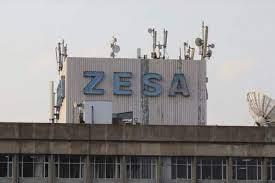News / National
Zesa secures 600MW utility batteries
26 Oct 2024 at 11:40hrs |
0 Views

In a significant move to address persistent power outages affecting the region, the Zimbabwe Electricity Supply Authority (ZESA) is actively procuring large utility batteries that will bolster the national grid. With a remarkable output of 600 megawatts, these batteries are comparable to the output of the Hwange Unit 7 and 8 units.
On Thursday, ZESA outlined its strategic initiatives aimed at enhancing electricity distribution and transmission capacity. In an interview, ZESA Executive Chairman Dr. Sydney Gata discussed the company's proactive approach to improving the energy landscape in Zimbabwe.
"We are procuring utility batteries—very large batteries—which will have an immediate impact once delivered. They will provide 600MW of battery storage, equivalent to the size of Hwange 7 and 8, making this a significant development," Dr. Gata explained.
The new batteries will serve multiple purposes: they will help mitigate load shedding more effectively, stabilize the network, and store the intermittent output from renewable sources like solar and wind energy. "As we move forward, there will be a shift away from confined power plants, and we will increasingly rely on wind and solar technologies, which require robust battery storage support," he noted.
In addition to battery procurement, ZESA has received offers from 14 companies to manufacture a wide range of essential equipment for the electricity sector, including power cables, smart meters, parabolic troughs, photovoltaic solar panels, lithium-ion batteries, inverters, and heavy-duty electric vehicles. Dr. Gata emphasized that building primary infrastructure for the energy sector is a long-term investment.
"This industry does not have short-term opportunities for its primary infrastructure. When stability is restored, it is almost forever," he asserted.
Dr. Gata also announced an exciting partnership with Dinson Iron and Steel Company of Manhize, highlighting ZESA's significant demand for steel to construct transmission infrastructure. Under this partnership, ZESA will source steel at approximately 40% cheaper than current market prices, aiding in its cost-saving strategy.
"Steel is crucial for constructing our transmission and distribution infrastructure, including the large towers and poles necessary for effective electricity delivery," he explained.
"This partnership is a privileged opportunity that will anchor our strategy, ensuring we have the necessary materials at reduced costs."
As ZESA continues to advance its initiatives, the focus on long-term infrastructure development and the integration of renewable energy technologies will be pivotal in shaping the future of Zimbabwe's energy sector. Dr. Gata's commitment to stabilizing the network and reducing load shedding marks a positive step towards ensuring a reliable electricity supply for all Zimbabweans.
On Thursday, ZESA outlined its strategic initiatives aimed at enhancing electricity distribution and transmission capacity. In an interview, ZESA Executive Chairman Dr. Sydney Gata discussed the company's proactive approach to improving the energy landscape in Zimbabwe.
"We are procuring utility batteries—very large batteries—which will have an immediate impact once delivered. They will provide 600MW of battery storage, equivalent to the size of Hwange 7 and 8, making this a significant development," Dr. Gata explained.
The new batteries will serve multiple purposes: they will help mitigate load shedding more effectively, stabilize the network, and store the intermittent output from renewable sources like solar and wind energy. "As we move forward, there will be a shift away from confined power plants, and we will increasingly rely on wind and solar technologies, which require robust battery storage support," he noted.
In addition to battery procurement, ZESA has received offers from 14 companies to manufacture a wide range of essential equipment for the electricity sector, including power cables, smart meters, parabolic troughs, photovoltaic solar panels, lithium-ion batteries, inverters, and heavy-duty electric vehicles. Dr. Gata emphasized that building primary infrastructure for the energy sector is a long-term investment.
Dr. Gata also announced an exciting partnership with Dinson Iron and Steel Company of Manhize, highlighting ZESA's significant demand for steel to construct transmission infrastructure. Under this partnership, ZESA will source steel at approximately 40% cheaper than current market prices, aiding in its cost-saving strategy.
"Steel is crucial for constructing our transmission and distribution infrastructure, including the large towers and poles necessary for effective electricity delivery," he explained.
"This partnership is a privileged opportunity that will anchor our strategy, ensuring we have the necessary materials at reduced costs."
As ZESA continues to advance its initiatives, the focus on long-term infrastructure development and the integration of renewable energy technologies will be pivotal in shaping the future of Zimbabwe's energy sector. Dr. Gata's commitment to stabilizing the network and reducing load shedding marks a positive step towards ensuring a reliable electricity supply for all Zimbabweans.
Source - The Herald
Join the discussion
Loading comments…
































